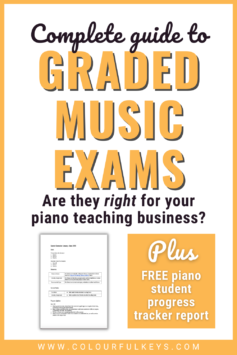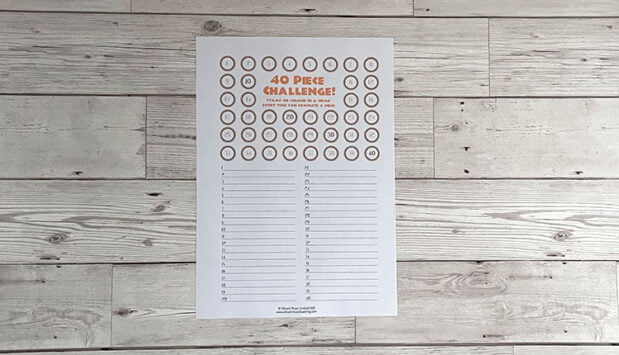
This blog post about the pros and cons of piano exams was written by Catherine Sipher. Catherine is a virtual piano teacher located outside Boston, Massachusetts USA. With over 20 years of piano teaching experience, nothing brings her more joy than sharing the beauty of music with her students. When not teaching, Catherine can be found spending time in nature, writing, practising yoga and enjoying time with her 6 children.
Piano exams can be a fantastic recognition of success, but they can also pile pressure on students and families unnecessarily. And what’s right for one student can be completely wrong for another. How do you determine which is which?

Whether you’re a new piano teacher or you have 20 years under your belt, piano exams are a hot topic.
There are some studios that embrace piano exams, encouraging all their students to take every single grade. Other studios selectively choose to enter students for only certain levels. And others yet choose not to offer exam preparation at all.
If you’re on the fence about encouraging an exam for any of your piano students, here are some considerations to help you land on one side or the other of the debate.
Robust Curriculum
Most teachers would agree it’s important that our students achieve a certain level of essential musical knowledge.
Pro: Motivation
Getting ready for exams forces us to prepare our students for assessment in areas such as technical exercises, aural work, sight reading and theory.
So if you find yourself dragging your feet when it comes to ear training, or you need a kick in the pants to include sight reading in lessons more frequently, exams might be just the motivator you need.
Along those same lines, you can use exam preparation as a reason when convincing a grouchy student to work on something they might normally resist. 😉
Pro: Parent Reassurance
Exams are a certified, quick-and-easy way for parents to see progress in piano lessons, especially when they’re not musicians themselves or if they’re unsure about how lessons are going.
If you consistently find that parents are pushing for their kids to take exams, it could be that you’re not providing enough feedback or communicating the progress their children are making.

Subscribe to updates and get the Student Progress Report Template
Enter your details to subscribe to the newsletter for piano teachers with information, tips and offers.
I hate spam as much as you do! I’ll only send you information that’s directly relevant to music teachers and you can unsubscribe at any time.
If you’re a member of Vibrant Music Teaching, you can download the Parent Progress Reports from the VMT Printable Library. Not part of the amazing VMT membership yet? Still on the fence? Never heard of it? Learn more about the movement that’s sweeping the globe in this online video tour.
Con: Limited Repertoire
Repertoire requirements for exams don’t change very often. Therefore, many teachers choose to teach strictly from a narrow list of popular exam repertoire.
Tip: Explore New Repertoire
Don’t restrict yourself or your students! With so much music to choose from, don’t limit yourself to just a few options. As you gain more teaching experience, gradually develop a wide selection of repertoire you’re able and willing to teach.
Use this opportunity to encourage students to explore their own voice and style.
The 40-Piece Challenge is a great approach to use if you want to encourage your exam students to work through a lot of repertoire in a single year. Download this tracker from the VMT Library to keep the motivation going!
You may also consider choosing an exam board that allows your students to perform pieces outside of the exam syllabus, as students tend to be more motivated by pieces they particularly love.
Structured Levels
Learning needs a good equal dose of freedom and structure to be effective. While a comprehensive curriculum is critical for creating well-rounded musicians, it’s just as important that the content is paced appropriately.
Pro: Scaffolded Levels
If you’re new to teaching, or you don’t have your own curriculum, exam syllabi can provide a good starting framework to help you with the structural side of the equation.
Piano exam levels are scaffolded, making them accessible to students of varying abilities. They can also be a useful tool to help you understand where a transfer student is in their music learning by establishing what they’ve already learnt.
Remember, exam syllabi are not the be-all-and-end-all of what you should teach at each grade, but they can be useful when planning what to teach next.
Con: Preparation Time
Due to their intensive nature, exam preparation can end up consuming the majority of a student’s lessons each week, depending on what material they’ve already mastered at each level.
As a result, student-led repertoire and harder-to-assess creative skills, such as improvisation and composition, can often be neglected.
Tip: Evaluate Student Goals
Before committing yourself and your student to the time needed to prepare for exams, determine if the exam requirements align with that particular student’s goals.
Consider whether your student needs to take exams at every grade level.
Oftentimes, skipping a grade or taking a year off between grade exams can be the breathing space students need to excel.
Measurable Goals
Students, teachers and parents alike rely on measurable goals to guide them along the musical journey. And exams are one way of providing those measurable goals.
Pro: Creating Motivation
Having a longer-term goal, like preparing for piano exams, can keep both students and teachers motivated. Students especially can feel a sense of accomplishment for meeting the exam’s requirements and receiving encouraging marks from the judges.

In addition, piano exams align neatly with S.M.A.R.T. goals (specific, measurable, achievable, relevant and time-bound), so exams can also be a great model for helping students learn how to set their own targets.
Con: Long-Term Project
Piano exams can sometimes turn into multi-month, long-term projects. You should avoid this as much as possible, as it can detract from your own desired curriculum and be a drain on your students.
Tip: Choose the Right Exam Level
Plan your teaching so that students take exams when they’re already playing well at the required grade; don’t use exams as a reason to push a student to progress more quickly than they otherwise would.
Exams are designed to assess your student’s current ability, so they shouldn’t take a long time to prepare for.
Remember, we wouldn’t dream of teaching students to read and write just by learning 3 novels a year and memorising the alphabet. The same is true of music.
Neutral Critiques
Ever heard the expression, “It takes a village to raise a child”? Well, the same could be said for raising a musician, too.
Pro: New Musical Thoughts
Students and teachers alike can benefit from observations offered by exam adjudicators.
Most judges provide constructive comments on a student’s performance in order to inspire, encourage and support the budding musician. Their insights can reinforce what you’re already encouraging in your student, or provide new thoughts and ideas.
Con: Negative Feedback
Not all judges are as verbose with their thoughts as others. Sadly, some judges never seem satisfied and won’t give a “perfect” score despite a brilliant performance.
Because of this, judges’ comments can occasionally be found wanting or discouraging. Thankfully, this isn’t typical.
Tip: Music Is Subjective
Before reading the judges’ marks and comments, prepare yourself and your student to receive the feedback with grace. Remember, adjudication is as subjective as the art of playing the piano.
Use this as an opportunity to explore the subjectivity of music.
I also like to remind students that judges are people, too. I have a funny story of accompanying a student for their exam, only to discover later that the examiner themself was being “examined” for their ability to examine well.
Performance Opportunities
Exams can be nerve racking! Even when students take exams with their teacher in their own home or studio and upload their performance digitally to the exam board, without ever performing live in front of an examiner, the fact that they have to perform can be daunting.
Pro: Overcoming Performance Anxiety
Learning to perform through nerves is a critical skill for pianists, and piano exams are a great opportunity to work through performance anxiety.

The more students can practise performing under watchful eyes, the more confident their public performances will become.
Con: Student Stress
I think today’s children and teens are under a lot more stress than we were at their age. Students who are under a lot of pressure tend to have higher levels of anxiety in general, not to mention performance anxiety.
From over-scheduling activities to dealing with social media, peer pressure and higher expectations from others, adding piano exam preparation to the mix might just break the proverbial camel’s back.
Tip: Choosing Exams Wisely
If your student is prone to debilitating anxiety or under a particularly high level of stress, consider trying different exam formats.
These days, your students don’t always have to go to a centre to take their exams. Depending on where you live, other options such as virtual exams or pre-recorded, at-home exams can divert much of the pressure.
Some exam boards are notorious for harsh marking, so you might like to try a board with more encouraging feedback.
Expense
The cost of exams isn’t limited to time. Financial considerations should also be taken into account, including the cost of:
- Entrance fees
- Books and materials
- Longer lessons
Con: Financial Investment
The overall cost of participating in piano exams can be taxing on some families, especially if they have multiple students performing.
Tip: Educate Parents
When selecting which piano exams to recommend, evaluate the cost and compare from one exam board to another. Some exams are more costly than others, so do your research.
Before registering students for exams, always inform the parent in writing about all associated costs, including the cost of books and other support materials. I suggest getting their consent either in an email or with a signature on a letter, so there is no confusion down the road.
Avoiding the Slippery Piano Exam Trap
Even with all of this taken into account, it can be easy for parents, students and teachers to be lured into using piano exams as their main course for piano study.
But beware! Having a top grade in piano doesn’t a pianist make!
Here are a few questions to ask yourself when debating whether or not to encourage piano exams for your students.
Questions for the Student
- Would piano exams help them reach their goals?
- How do they work under pressure?
- Do they have the attention span to devote to such an endeavour?
- Does the family have the financial resources to participate in piano exams?
Questions for the Teacher
- What exams are available in my area?
- What organisations do I need to join in order to participate in piano exams?
- Do I have the time to devote to the extra admin work related to exams?
- Do I have the skills to prepare my students for these tests?
Whatever your goals as a piano teacher and piano studio, let’s make piano exams a proactive choice rather than the default one.

What insights would you add to this list of piano exam pros and cons?
Do your students participate in piano exams? Share your experiences in the comments below. 🙂
For more resources about piano exams, repertoire, lesson plans and more, visit Nicola’s Planning Lessons hub page.
